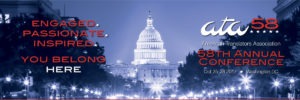9 Things You Can Do Today to Get the Most out of ATA58
This October, some 2,000 language professionals will swarm the Hilton in Washington DC for the 58th Annual ATA Conference. They will push through crowds of people to find the next packed presentation room, will sit in a sea of unfamiliar faces, will spend their entire waking day taking in new information and trying desperately to remember the name of the person they met two seconds ago. It’s overwhelming. It’s exhausting. It’s also exhilarating.
Even the most introverted among us feel a thrill being around people who understand our career and share our interests. In the chaos, it is easy to miss opportunities and come away from the conference feeling disappointed. Below are nine ideas for how you can prepare to get the most out of ATA 58.
1) Double-check your marketing materials
Update your resume and triple check for any mistakes. Do the same for your business cards and order extras now.
Find something extra to bring to help you stand out. This could be a personalized name badge, a lanyard—something pretty, crazy, or specific to your specialization, stickers or pins to show your language or specialization… Anything that encourages others to approach you about something you are interested in is helpful.
As you update your marketing materials, write out previous jobs and relevant experience. What stands out? What are you most proud of? What might be funny (and positive and professional)? What showcases your talent, knowledge, and drive?
Add to this list any time you take on a new job, and always note why the job is important. (A challenge you overcame, an impressive client, new information learned, etc.) If you don’t have a lot of job experience, consider classes you’ve taken, volunteer work you’ve done, research you are excited about. Review this list before the conference so that you will have specific, positive, professional responses when people ask you about your experience.
2) Research the presentations… and the presenters
Does the presenter have a website? Social media accounts? Find what information they’ve made public. Look for common interests, common languages, and anything you would like to ask about. Write all of this down and review it before the presentation. After the presentation—introduce yourself!
If you’re really excited about a presenter or a topic, feel free to send them an email in advance sharing your excitement, asking a question, or pointing out a shared interest. Everyone likes enthusiastic people in the audience. And while we’re at it, why wait until after the conference to follow them on Twitter?
3) Research the companies at the job fair and the exhibit hall
Look for specific things to discuss with any company you are interested in. What skills are they looking for? Why are you a good match? Why do you like this company? Research can make you stand out in a busy job fair. If you can find out who will be representing the company, why not drop them a line today, and tell them how much you’re looking forward to meeting them?
One easy way to start this now is with the ATA Conference App. During the conference you can use it to keep track of the schedule and stay up-to-date, and you can use it today to look through the list of represented companies as you start your research.
4) Reach out and make friends
Whether you’ve met fellow attendees in past or only know them online, a quick social media post or a brief email to let people know that you look forward to seeing them or to plan a coffee together can go a long way.
5) Research the area around the conference
A little research saves a lot of time and stress during the conference. Find a place you can recommend for lunch or coffee. Find a place you can slip away, where others can’t see you, for some quiet time. Find cultural places in the area specific to your language/specialization/interests. Look up a few practical places around the conference: ATMs, drug stores, phone stores for chargers, etc.
6) Set specific goals
Goals give focus and clarity in the midst of chaos. Set a goal for each presentation: “I want to meet two people who translate in this field into my B language,” “I want to learn X, Y, Z.” Don’t assume it was a bad presentation if it didn’t cover your specific question. Asking your question at the end of the session is a great way to meet people.
7) Prepare for questions
If you feel awkward when asked the standard conference questions, prepare for them now. “Why are you here?” “Did you come last year?” “What did you think?” “Are you enjoying the conference this year?” “How did you become a translator?”
“Last year I was just too overwhelmed and intimidated to come,” may be true. But it might be better to try something like: “I’ve been developing my business this year, learning about the profession, expanding my client base, and I’m so excited to be here!” Focus on what you’ve learned, what you look forward to learning, what excites you, how it fits with your work or a new avenue you are interested in exploring. Be honest, positive, and professional.
8) Post to social media
Everybody recommends this, but I’m going to be the one negative voice here. Posting to social media that you are going to be traveling on specific dates is a potential safety risk. You don’t have to do it. However, if you’re comfortable with it, it can be a great way to connect with people before the conference and can make it easier to plan coffee dates, lunches, trips to cultural sites, etc.
But remember, you can do much of this via email, phone calls, and private messages if you prefer not to post about it publicly. Where appropriate, you can also contact favorite clients to tell them that you will be attending a presentation pertinent to their field.
9) Schedule time after the conference
Immediately following the conference, you will have so much to go over, you will have work that’s piled up, and then there’s the laundry… If at all possible, schedule a few days after the conference to catch up and recharge before diving back into your routine. Otherwise, you may never get to your post-conference to-do list.
After the conference is the time to post to social media about what you learned and who you met. Write an article or two… Blog… follow up with the people you met. This is the single most important thing you can do. Send emails, private messages, tweets. Connect on LinkedIn and Twitter… And be prepared to do it all again in a week or two.
This is where you will really stand out. So prepare for it now.
If you plan to mail cards after the conference, buy them now. Address them if possible. Write up ideas for what you might say. Streamline your social media. (Link your accounts so one post will go to multiple accounts, learn to schedule your posts, etc.)
The key is to be intentional and organized about what you want out of any large conference. After all, you are setting aside time and money to be there. Why not make the most of it?
Author bio
 Anne Goff is currently writing a book on networking for introverts. She has an MA in French>English Translation and a BA in French. She translates legal texts and particularly enjoys helping adoptive families bring their children home. She has lived in countries with red, white, and blue flags—France, the UK, and the US. When not translating, writing, or introverting, Anne teaches French at university and speaks about networking and business for the non-extraverted. Contact her: anne@aegtranslations.com, www.aegtranslations.com.
Anne Goff is currently writing a book on networking for introverts. She has an MA in French>English Translation and a BA in French. She translates legal texts and particularly enjoys helping adoptive families bring their children home. She has lived in countries with red, white, and blue flags—France, the UK, and the US. When not translating, writing, or introverting, Anne teaches French at university and speaks about networking and business for the non-extraverted. Contact her: anne@aegtranslations.com, www.aegtranslations.com.
Enter to win a free copy of Anne’s upcoming book on networking for introverts. Send her an email with “I’m interested in your book!” in the subject line.


ATA58 will be my first conference and I’m really looking forward to meeting new people and networking. Thank you so much for this blog, it really answered many questions I had.
We are looking forward to it too, Kellen! Be sure to follow http://ata-conf-newbies.org/ also for more specific info about the conference. See you in D.C.!
[…] Translation Buyers Compare Notes Dollars and Sense: Tips for Modern-day Localization Pricing 9 Things You Can Do Today to Get the Most out of ATA58 How to Reach a Non-English-Speaking YouTube Audience Les grands commandements de la localisation de […]